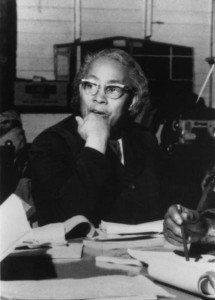Graduate Internships at the Avery Research Center
| Hosting Institution: | Avery Research Center for African American History and Culture in Charleston, South Carolina
Through its research facilities, museum exhibits, archival collections and numerous outreach programs, the Avery Research Center tells the rich story of the lives and contributions of Africans and African Americans in the Lowcountry and the wider African Diaspora. |
| Listing Department(s): | School of Library and Information Science (USC); History, Historic Preservation, Arts Management (CofC); African American Studies; Urban Studies; Political Science; Sociology; Anthropology; Women’s and Gender Studies; African Studies |
| Requested Number: | 2 Graduate Students |
| Commitment: | Internships begin at the start of the Fall or Spring semester and require at least 10 hours/week for 14 weeks. Please inquire for information on Summer internships. |
| Schedule:
|
The interns must be available for ten hours during the workweek, Monday through Friday, during the hours of 10am to 5pm.
The weekly time commitment may be broken into shifts of 2-5 hours. |
| Compensation: | Academic Credit / Unpaid |
| Goals: | The Avery Research Center for African American History and Culture seeks undergraduate interns to assist in a dynamic and engaging program of collecting, transcribing, and archiving manuscript collections and oral histories. Students will gain professional training and hands-on experience in the collection of oral histories that reveal untold stories of the civil rights revolution; labor and work; gender and African American women; race and the city of Charleston; and struggles for “Black Power” in the American South. Students will be trained in the professional standards of conducting, transcribing, preserving, and digitizing oral history interviews. As students work with the material, they will also be encouraged to use our oral history collection to conduct their own research and student papers. |
| Description: | Avery interns will be stationed in the Reading Room to assist the Public Historian with the transcription of oral histories already conducted. Additionally, interns may have the opportunity to go out into the local community to conduct oral histories of their own, with the oversight and assistance of the Public Historian.
Student interns will also have the opportunity to work with the Director of Archival Services on Avery’s substantial manuscript collections. Students will assist with reference material, exhibits and tours, archival arrangement, organization, and description. Each intern will be expected to write at least one publishable blog post on an oral history collection or research topic related to Avery’s archival holdings. Where possible, the Public Historian will strive for a match between student interests and oral history projects. |
| Enrichment: | Weekly, the Public Historian will have one-on-one meetings with interns to assess the students’ experiences and to discuss the problems, possibilities, and potential richness of their work in oral history. |
| Evaluation: | Students will have mid-term and end-of-term evaluations conducted by the Public Historian. |
| Feedback: | Students will also have the opportunity to provide feedback to the Avery internship program through mid-term and end-of-term evaluations. |
| To apply or request more information, please contact Avery’s Public Historian, Dr. Robert Chase, at chasert at cofc dot edu. Interested applicants should include a current resume and cover letter. | |


Recent Comments